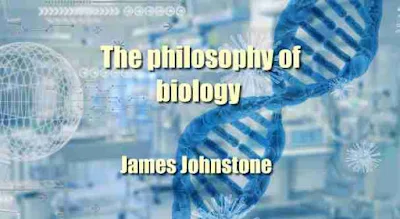The philosophy of biology
 |
| The philosophy of biology |
The conceptual world.-- The organism as a mechanism.-- The activities of the organism. -- The vital impetus. -- The individual and the species. --Transformism. -- The meaning of evolution.-- The organic and the inorganic.-- Mathematical and physical notions
Excerpt:
It has been suggested that some reference, of an apologetic nature, to the title of this book, may be desirable, so I wish to point out that it can really be justified. Science, says Driesch, is the attempt to describe Givenness, and Philosophy is the attempt to understand it. It is our task, as investigators of nature, to describe what seems to us to happen there, and the knowledge that we so attain — ^that is, our perceptions, thinned out, so to speak, modified by our mental organisation, related to each other, classified and remembered — constitutes our Givenness.
This is only a description of what seems to us to be nature. But few of us remain content with it, and the impulse to go beyond our mere descriptions is at times an irresistible one. Fettered by our habits of thought, and by the limitations of sensation, we seem to look out into the dark and to see only the shadows of things. Then we attempt to turn round in order that we might discover what it is that casts the shadows, and what it is in ourselves that give shape to them.
We seek the Reality that we feel is behind the shadows. That is Philosophy. The Physics of a generation earlier than our own thought that it had discovered Reality in its conception of a Universe consisting of atoms and molecules in ceaseless motion. What is described were only motions and transformations, but it understood these motions and transformations as matter and energy. Yet more subtle minds than the great physicists of the beginning of the nineteenth century had already seen that sensation might mislead us.
There was something in us that continually changed — ^that was our consciousness, and it was all that we knew. If external things did exist they existed only because we thought of them. But we ourselves exist, for we are not only a stream of consciousness that continually changes, but there is in us a personality, or identity, which has remained the same throughout all the vicissitudes of our consciousness. If the things that exist for us exist only because we think them, and if we also exist, then we must exist in the thought of an Absolute Mind that thinks us.
Physical Science, studying only motions and transformations, -understood that there was something that moved and transformed — ^this was matter and energy. Mental Science, stud5dng only thought, understood that nature was only the thought of a Universal Mind. Either conclusion was equally valid Philosophy (or metaphysics), and neither could be proved or dis- proved by the methods of Science. The speculative game is drawn, said Huxley, let us get to practical work! Both Physics and Biology did get to work, with the results that we know. But Physics advanced far beyond the acquirement of the results that stimulated Biology to formulate our present hypotheses of evolution and heredity. As its knowledge accumulated, it began to doubt whether matter and energy, atoms and molecules, mass and inertia — all those things which it thought at first were so real — ^were anj^hing else after all than ways in which our mental organisation dealt with crude sensations.
Publication date: (1914)
Publisher Cambridge, University Press
Download 8.5 MB
Publisher Cambridge, University Press
Download 8.5 MB
